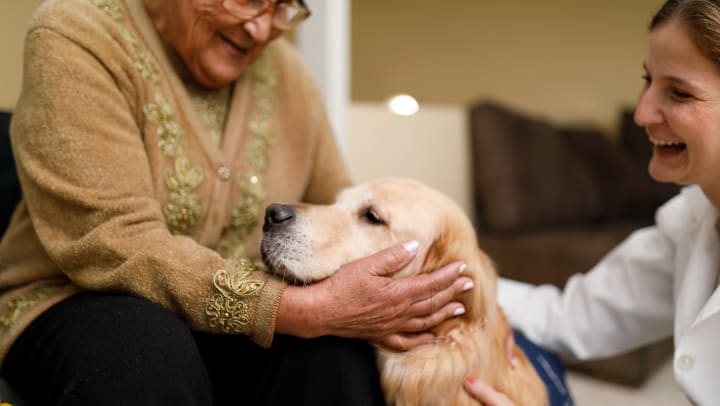The powerful bond between animals and humans has been well documented throughout history. Pet therapy, or animal-assisted therapy, is a growing field using trained animals (most commonly dogs, but also cats, birds, horses – just about any domesticated animal) to help people of all ages cope with or recover from health problems and mental health disorders. For seniors, pet therapy can offer a variety of emotional and physical benefits to assist in healthy aging.
What is Pet Therapy for Seniors?
The companionship of a pet can give older adults a sense of purpose and engagement, whether in a retirement community, hospice, rehabilitation center, or in their own home. An article in the National Institutes of Health archive, PubMed Central, analyzed a number of studies that have shown spending time with a pet is a powerful way to combat loneliness and isolation, while also reducing stress and promoting overall health and well-being.
There are three main types of pet therapy for seniors:
- Ownership Therapy. This is a good option for more active seniors who are able to properly care for a pet and pay for veterinary care.
- Visitation Therapy. With this common type of pet therapy, animals visit the senior in his or her home or senior living community.
- Animal-Assisted Therapy. In this more intense form of pet therapy, seniors undergoing rehabilitation after illness, injury, or surgery, are paired with highly sensitive, trained animals (such as dolphins, horses, or dogs) as part of their therapy, to help promote physical skills and build confidence.
Physical Benefits
Pet ownership and interaction have been associated with improved cardiovascular health in the form of lower blood pressure, lower heart rate, and a greater ability to cope with stress. Older adults who own dogs tend to walk more and have higher levels of physical activity than those without a dog. This leads to improved mobility which can help reduce their chances of falling.
Emotional & Mental Health Benefits
Animal-assisted activities and therapy have also been shown to reduce symptoms of depression for older adults – particularly in senior living communities. This is true whether or not they have any cognitive impairment (such as dementia) or mental illness. Pet therapy also helps reduce anxiety in people with Alzheimer’s disease. Interactions between seniors and animals appear to provide social support and a sense of connection, reducing the risk of loneliness and improving quality of life, mood, and social interactions.
What Are the Risks?
The biggest concerns when it comes to therapy involving animals are safety and sanitation. Most senior living communities or home health services that use pet therapy have strict rules to ensure the animals are clean, vaccinated, well-trained, and screened for appropriate behavior. Depending on the type of pet, there can be an increased risk of falls or injuries resulting from tripping over the animal, and there is a possibility of depression after the loss of a pet.
Enjoy all the benefits that come with spending time with an animal friend. For more recommendations on healthy aging, read some of our other Brightwater Senior Living blog posts.
